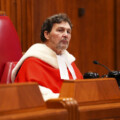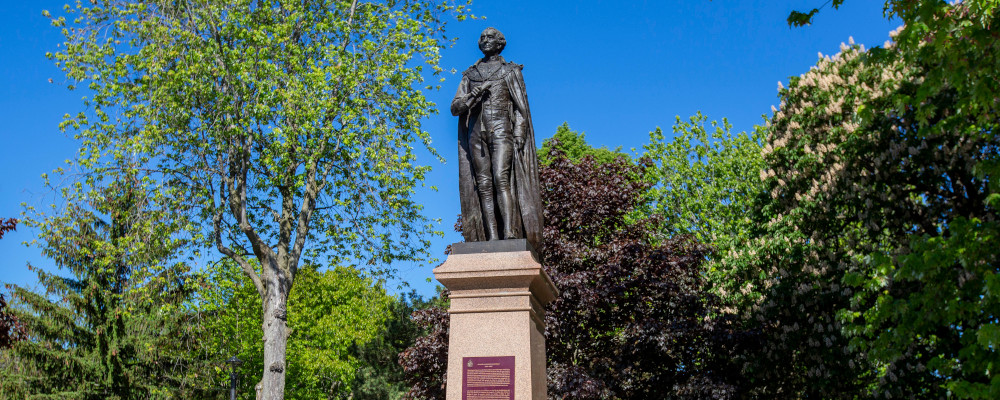Canadians’ ignorance of our own history is a pervasive and regrettable problem. The Hub is pleased to play a small part in attempting to turn this tide by presenting a weekly column from author and historian Antony Anderson on the week that was in Canadian history.
January 10 or 11, 1815: Sir John A. Macdonald’s birthday
“It may be said without any exaggeration whatever that the life of Sir John Macdonald, from the date he entered Parliament, is the history of Canada.”
– Wilfrid Laurier, House of Commons, June 8, 1891
Here’s a radical thought in this day and age: I remain in awe of this country. Here’s another radical thought: I remain in awe of Macdonald’s work and even the man himself. I see all his flaws and his failings. They’re right out there. Some are appalling. They reflect the larger tapestry of the world that shaped him. However, I was never looking for a saint in my search through history to understand this country, so, like I say, I remain in awe.
He was born in Glasgow, Scotland in 1815 though we’re not sure of the day, possibly the 10th of January (as noted in a birth registry), possibly the 11th of January (as recorded by his father). It seems right that Canada’s first prime minister should be born somewhere else, a permanent note to the collective self that we Canadians have all, at some point, come from away. So in his birth, Macdonald is the embodiment of one of our defining ideas: we are the immigrant nation ever remade, and he is the immigrant so central to that remaking.
When I think of Macdonald, I imagine the five-year-old boy, standing on the swaying deck of a crowded passenger ship, staring out at the endless ocean of fears and dreams, enduring six weeks at sea, his safe arrival hanging by thin threads, the captain, the crew, the weather. He was on that ship because his father, a failed shopkeeper, had run out of chances at home and decided to gamble on a remote cluster of scattered, disconnected British colonies with little in common and much to divide them. The family reached Quebec City and then embarked on another hazardous journey by river to Kingston in what was then Upper Canada—really a Scottish outpost. The tragic irony in this epic narrative is that these waves of desperate newcomers striving for more justice and hope were generating such a terrible injustice for the Indigenous nations they displaced.
Macdonald’s parents gave their only surviving son the best education they could afford, and surely he was the fulfillment of all their wild dreams. He became a lawyer, established his own practice, made a name, and made his money in land deals and railway investments. He went into politics, swayed the crowds with his humour and savvy, and kept winning elections. Leaving behind local politics for the larger canvas of nation-building, he revealed that he could combine the visionary and the pragmatic.
With friends and foes, he displayed a vulnerable human touch perhaps because his life was marked by so much heartbreak: a younger brother struck and somehow killed by a possibly drunken servant; a frail, bedridden first wife who succumbed to her many maladies after 14 years; a first son who died after 13 months; a daughter born in his second marriage, profoundly disabled who remained essentially a child her whole life. His second wife recalled him in his old age lovingly rummaging through the daughter’s box of toys, lost in his memories. His alcoholism at times overwhelmed him.
Macdonald was of course caught up in some of the hateful thinking of his time, as we ourselves are caught up in our own. He said absolutely appalling things about the Chinese living in Canada at the time. He expected, indeed, hoped Indigenous Peoples would become good British subjects because he thought that was the best thing to be. He was, however, able to transcend some of this conventional thinking, perhaps most brilliantly with the central fact of Canadian politics.

Macdonald came from a small, conquered nation that had endured invasion and imperialism and which then pivoted to co-exist and eventually flourish within a union of other kingdoms. Biographer Richard Gwyn has argued that this frame of view equipped Macdonald to better understand the demands and anxieties emanating from another conquered nation, Quebec. To appreciate Macdonald’s triumph on this point, one only has to behold George Brown, an influential newspaper editor, a father of Confederation, and a self-assured and virulent anti-French bigot. Even when he was arguing for the right reform, Brown’s pious stridency was toxic to the greater good. Hence Macdonald’s wise quip that Canadians preferred him drunk to George Brown sober.
Confederation wasn’t Macdonald’s idea or even his great passion at first, but he grasped its potential, joined the incoming tide, and became a dominant creative force at the constitutional conferences that took place between 1864 and 1866, where he dug into the details and is thought to have authored most of the resolutions. The paper trail is frustratingly thin so we will never know the real extent of his contributions or the exaggerations. I suspect some of his greatest work was done informally, off-stage, where he used his formidable gifts of persuasion to shape essential compromises.
Then, as prime minister, he worked political magic to maintain the tenuous confederation of solitudes against improbable odds, anchored in his accommodations and tolerance with Quebec. In so doing, he laid the foundation for this, one of the world’s oldest and most inclusive democracies. Thanks to Macdonald’s work with Quebec, the common ground in this country has always become more and more expansive. That was his gift to us.
As to his crimes or sins or limitations (however you wish to frame them), which were shared by the vast majority of his contemporaries, and which, no question, inflicted terrible harm and cultural devastation for the Indigenous peoples on this land, it is for the current generation of Canadians and no doubt the next to heal and reconcile that ongoing personal and communal anguish. Macdonald and his Canada could only see as far as they could. The same applies to us.
Recommended for You

Michael Kaumeyer: Polite decline: Canada’s aversion to being our best is holding us back

Howard Anglin: Lament for a Lament

‘A place where anybody, from anywhere, can do anything’: The Hub celebrates Canada Day

Peter Menzies: It’s no wonder Canadians are tuning out the legacy media




